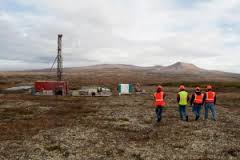Alaska mine developers call on EPA to obey the law

By M.D. Kittle | Watchdog.org
MADISON, Wis. – Just follow the law.
That’s what the Pebble Limited Partnership, the investment group behind a proposed multi-billion dollar copper and gold mine in southwest Alaska’s bush country, urges in a pointed letter this week to the Environmental Protection Agency.
MINE GAME? Site of the proposed Pebble Mine project in southwest Alaska.
“In disregard of the rule of law, established precedent, and long respected public policy, (the EPA) has contrived to preemptively block the filing of permit application for developing the largest and most valuable underdeveloped supply of copper and gold in North America, a resource that could be critically important to the U.S. economy and employment in Alaska,” Pebble Partnership writes.
“Rather than allowing the filing of a mining permit application, EPA employees secretly plotted with environmental activists to undermine the ability of land owners to objectively evaluate at develop the proposed mining of the Pebble deposit …, and thereby establishing a precedent that will have long-term harmful impacts on investment and job creation in the United States,” PLP asserts in the letter.
The company charges EPA misused U.S. taxpayer funds to “create a flawed, junk science laden report, called the Bristol Bay Assessment, designed to negatively influence government, financial markets, and public policy.”
The letter is in response to EPA’s decision in late February to initiate the Clean Water Act’s Section 404(c), which the EPA would use to block or greatly restrict the Pebble Mine in Alaska’s Bristol Bay region. The agency says it is now gathering information.
EPA administrator Gina McCarthy at the time said the decision came down to protecting local resources.
“Extensive scientific study has given us ample reason to believe that the Pebble Mine would likely have significant and irreversible negative impacts on the Bristol Bay watershed and its abundant salmon fisheries,” McCarthy said.
Bristol Bay is home to half of the world’s sockeye salmon population, and the fishing industry in Alaska and beyond has pumped in a lot of money fighting the mine and pushing EPA to kill it through the Clean Water Act.
But that “extensive scientific study” has come under scorching criticism by peer reviewers.
Michael Kavanaugh, a member of the National Academy of Engineering, has said the peer review on the EPA’s updated assessment draft, released in April 2013, “fails to meet” the EPA’s own criteria.
“The lack of an open and transparent external peer review process for review of the 2013 Assessment seriously erodes the credibility of the document, and the validity of basing any future management decisions on mining in the Bristol Bay watershed on findings” of the assessment, Kavanaugh, senior principal of Geosyntec Consultants, wrote in testimony.
Pebble is calling on the EPA to rescind its Section 404(c) letter and “revert to the well-established regulatory process under the National Environmental Policy Act for reviewing the Pebble Project.”
Pebble Partnership CEO Tom Collier said the company has reviewed an internal EPA memo from September 2010 that acknowledges EPA taking proactive steps to veto or restrict development at Pebble has “never been done before in the history” of the Clean Water Act. In the memo, EPA officials say invoking the provision will result in “immediate political backlash from Alaska,” and that the agency anticipates litigation.
“The memo also indicates EPA’s ambition to vastly expand its authority, calling the Pebble precedent a ‘model of proactive watershed planning’ that will allow it to undertake ‘watershed planning’ over vast areas of state, private and tribal lands anywhere in the United States,” Collier said in a statement issued Wednesday.
In an email to Watchdog.org, EPA spokeswoman Hanady Kader confirmed the agency has received letters from PLP and Alaska’s attorney general in response to EPA’s request for information under Section 404(c).
“EPA will review their submitted information thoroughly before deciding whether to move forward with any action to protect Bristol Bay fishery resources,” Kader wrote.
The agency has received plenty of support from environmental organizations opposed to the mine project.
The Natural Resources Defense Council, a New York City international environmental advocacy group, is among a long list of powerful environmentalists endorsing EPA’s initiation of the Clean Water Act provision.
“Now, as the people of Bristol Bay will tell (McCarthy) loud and clear, the EPA must take the next step, finalize its assessment, and initiate action under the Clean Water Act to stop the Pebble Mine,” NRDC president Frances Beinecke proclaimed in a statement before the EPA administrator’s trip to Alaska last fall.
Wish fulfilled.
But Collier warned the actions that the EPA is contemplating go well beyond Pebble. Shutting down a development project before developers have a chance to present their plan at a public hearing could have deleterious consequences, Collier asserts.
“It is a precedent that will be leveraged by environmental activist groups and will have a chilling effect on future investment and job creation throughout the country,” Collier said. “Congress never intended to grant EPA the authority to undertake proactive watershed zoning over broad areas of state and private lands when it passed the Clean Water Act, yet that is exactly what is happening here.”
Contact M.D. Kittle at mkittle @watchdog.org







